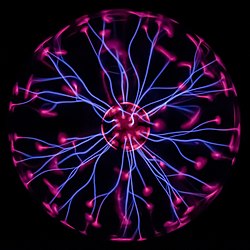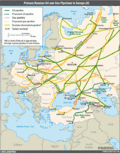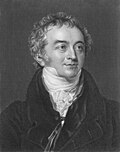Portal:Energy
| Main page | New articles & Tasks |
 The Energy Portal Welcome to Wikipedia's Energy portal, your gateway to energy. This portal is aimed at giving you access to all energy related topics in all of its forms.
|
Page contents: Selected article • Selected image • Selected biography • Did you know? • General images • Quotations • Related portals • Wikiprojects • Major topics • Categories • Help • Associated Wikimedia |
Introduction
Energy (from Ancient Greek ἐνέργεια (enérgeia) 'activity') is the quantitative property that is transferred to a body or to a physical system, recognizable in the performance of work and in the form of heat and light. Energy is a conserved quantity—the law of conservation of energy states that energy can be converted in form, but not created or destroyed. The unit of measurement for energy in the International System of Units (SI) is the joule (J).
Forms of energy include the kinetic energy of a moving object, the potential energy stored by an object (for instance due to its position in a field), the elastic energy stored in a solid object, chemical energy associated with chemical reactions, the radiant energy carried by electromagnetic radiation, the internal energy contained within a thermodynamic system, and rest energy associated with an object's rest mass. These are not mutually exclusive.
All living organisms constantly take in and release energy. The Earth's climate and ecosystems processes are driven primarily by radiant energy from the sun. The energy industry provides the energy required for human civilization to function, which it obtains from energy resources such as fossil fuels, nuclear fuel, and renewable energy. (Full article...)
Selected article
There are many motivations to improve energy efficiency. Reducing energy use reduces energy costs and may result in a financial cost saving to consumers if the energy savings offset any additional costs of implementing an energy efficient technology. Reducing energy use is also seen as a solution to the problem of reducing carbon dioxide emissions. According to the International Energy Agency, improved energy efficiency in buildings, industrial processes and transportation could reduce the world's energy needs in 2050 by one third, and help control global emissions of greenhouse gases.
Energy efficiency and renewable energy are said to be the twin pillars of sustainable energy policy and are high priorities in the sustainable energy hierarchy. In many countries energy efficiency is also seen to have a national security benefit because it can be used to reduce the level of energy imports from foreign countries and may slow down the rate at which domestic energy resources are depleted.
Selected image

Photo credit: Charliebrown7034
Skyglow over New York City, one form of light pollution.
Did you know?
- During World War I, the German Army produced shale oil from Yarmouk oil shale deposits in Jordan to operate the Hijazi Railway (pictured)?
- Dennis Spurgeon, formerly chief operating officer at uranium supplier USEC Inc., became the United States Assistant Secretary for Nuclear Energy in 2006?
- Japan Canada Oil Sands Limited was the first offshore oil company to exploit the Athabasca oil sands in Canada?
- Teesside Power Station is the largest combined-cycle gas turbine (CCGT) plant in Europe.?
- The Klaipėda Geothermal Demonstration Plant in Lithuania was the first geothermal plant in the Baltic Sea region?
- Hitachi Zosen Corporation built the first oil tanker in Japan in 1908 per an order by Standard Oil Company?
- Coalbed methane is a form of natural gas extracted from coal beds?
- When constructed in 1906, the Baku–Batumi pipeline was the world's longest kerosene pipeline?
Selected biography
Edison invented the first commercially practical electric light bulb which, by 1879 would burn for hundreds of hours. He was able to sell the concept to homes and businesses by mass-producing them and creating a complete system for the generation and distribution of electricity.
Edison patented an electric distribution system in 1880, and in January 1882 he switched on the first steam generating power station at Holborn Viaduct in London, UK. The direct current (DC) supply system provided electricity supplies to street lamps and a number of private dwellings within a short distance of the station. The first investor-owned electric utility, Pearl Street Station, New York City, started generating on September 4, 1882, providing 110 volts direct current to 59 customers in lower Manhattan.
Life magazine (USA), in a special double issue, placed Edison first in the list of the "100 Most Important People in the Last 1000 Years," noting that the light bulb he promoted "lit up the world." He was ranked thirty-fifth on Michael H. Hart's list of the most influential figures in history.
In the news
- 15 July 2025 – Indonesia–United States relations
- U.S. president Donald Trump announces a new trade deal with Indonesia, where Indonesia will purchase $15 billion in energy and $4.5 billion in agricultural products, along with 50 Boeing jets. Indonesia will also allow importation of U.S. products without tariffs, while the U.S. will maintain a 19% tariff on all goods coming from Indonesia. (Financial Times)
- 2 July 2025 –
- Iranian president Masoud Pezeshkian orders the suspension of cooperation with the International Atomic Energy Agency following the Iran–Israel war and the United States strikes on Iranian nuclear sites. (AP)
- 22 June 2025 – Middle Eastern crisis
- The International Atomic Energy Agency says no increase in off-site radiation levels was detected at the three targeted nuclear sites. (Al Jazeera)
General images
Quotations
- "In recent years, new nations have entered enthusiastically into industrial production, thereby increasing their energy needs. This has led to an unprecedented race for available resources. Meanwhile, some parts of the planet remain backward and development is effectively blocked, partly because of the rise in energy prices. What will happen to those peoples?" – Pope Benedict XVI, 2007
- "In order to prevent the harmful consequences that crude oil price volatility is having on the well-being of our people, it is urgent that we convene a World Leaders Summit to present alternative solutions to this serious problem, which could quite possibly be a significant shock to the prosperity of developing nations." – Leonel Fernández, 2005
Related portals
WikiProjects
WikiProjects connected with energy:
Other WikiProjects that may be of interest:
Major topics
Major categories
National energy supply, use & conservation
National electricity sector
Politics, economics, environment
- Climate change
- Energy conservation
- Energy economics
- Energy crises
- Energy development
- Energy policy
- Peak oil
Energy sources
- Fuels
- Biofuels
- Fossil fuels
- Fusion power
- Nuclear technology
- Renewable energy
- Energy conversion
- Electric power
- Energy storage
Energy-related design
Scientific usage
Help

Puzzled by energy?
Can't answer your question?
Don't understand the answer?
- Ask at the reference desk
- Read the Wikipedia help pages
For further ideas, to leave a comment, or to learn how you can help improve and update this portal, see the talk page.
Associated Wikimedia
The following Wikimedia Foundation sister projects provide more on this subject:
-
Commons
Free media repository -
Wikibooks
Free textbooks and manuals -
Wikidata
Free knowledge base -
Wikinews
Free-content news -
Wikiquote
Collection of quotations -
Wikisource
Free-content library -
Wikiversity
Free learning tools -
Wiktionary
Dictionary and thesaurus




















































































































































































